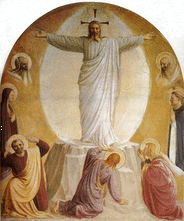
At that time: Jesus taketh Peter, James, and John his brother, and bringeth them up into an high mountain apart, and was transfigured before them. And so on, and that which followeth.
Sermon by St. John Chrysostom
The Lord had spoken much concerning dangers; and his own sufferings; and death; and the killing of his disciples. He had laid upon them many hard and grievous things. And all these were already their portion in this present life, or at least threatening them. Whereas the good things were but in hope and expectation. For example, he had taught them that whosoever should lose his life for his sake should find it, and that the Son of Man should some day come in the glory of his Father, and reward every man according to his works. Therefore it was to assure them by their own eyes, and show them what the glory is wherein he will come, that he manifested and unveiled the same to them, as far as in this life they were able to grasp it, lest they, and especially Peter, should grieve over much concerning their own deaths, or the death of their Lord.
Behold how he speaketh when he treateth of heaven and hell. He saith: Whosoever will save his life shall lose it, and whosoever will lose his life for my sake shall find it. And again: He shall reward every man according to his works. In these words he pointeth at both heaven and hell; but although he speaketh concerning both, he giveth a glimpse of heaven only, and not of hell. To see hell would have profited the brutish and stupid, but his disciples were upright and clear-sighted. Therefore for them it was enough to be strengthened by the better things. This was what suited Christ the best. Yet he left not the other altogether undone. Sometimes he set the horrors of hell, as it were, before their eyes, as for instance in the parable of the rich man and Lazarus; or again, in the parable concerning him who would fain wring the hundred pence from his fellow-servant.




